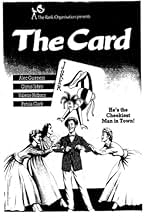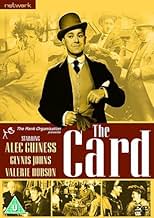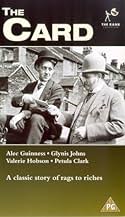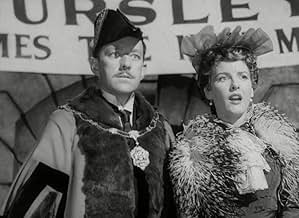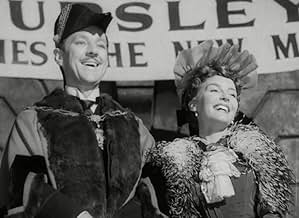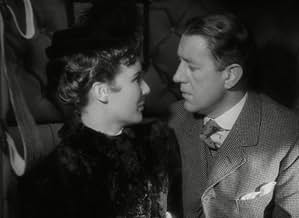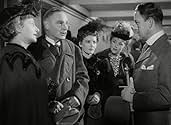Edward Machin, an Edwardian-era young rogue of lowly origin, decides he must do what he can to raise his living standards in order to see the world and shape his own destiny.Edward Machin, an Edwardian-era young rogue of lowly origin, decides he must do what he can to raise his living standards in order to see the world and shape his own destiny.Edward Machin, an Edwardian-era young rogue of lowly origin, decides he must do what he can to raise his living standards in order to see the world and shape his own destiny.
- Nominated for 1 Oscar
- 1 nomination total
John Adams
- Customs Official
- (uncredited)
Peter Copley
- P. Shillitoe
- (uncredited)
Mark Daly
- Lord Mayor
- (uncredited)
Arthur Dibbs
- Doorman
- (uncredited)
Deidre Doyle
- Widow Hullins
- (uncredited)
Henry Edwards
- Mr. Cotterill
- (uncredited)
- Director
- Writers
- All cast & crew
- Production, box office & more at IMDbPro
Featured reviews
A classic Alec Guinness, as the young man from the lower class who wants to move up in the world, and does, because he has the courage to go for it. In one scene his boss tells him off (not an exact quote), "So, you fancy yourself being with your betters, do you?" The cheeky reply is "Yes, don't you?"
The best line is when his assistant brings him a pile of money collected from his latest enterprise, and comments that it seems a lot of money for doing nothing. The response is: "But I did do something; I thought of it."
This is a funny, thoughtful, social commentary, with a great look at both the lower and upper classes.
The best line is when his assistant brings him a pile of money collected from his latest enterprise, and comments that it seems a lot of money for doing nothing. The response is: "But I did do something; I thought of it."
This is a funny, thoughtful, social commentary, with a great look at both the lower and upper classes.
Alec Guinness' reputation as a serious actor tends to overshadow the subtle but deftly comic early work he was involved in, even when the films themselves (especially his handful of Ealing classics) are highly-regarded. This was another fine (and reasonably popular) vehicle for him in which he plays a go-getter(!) who uses his wits – and the helping hand lent him by Fate – to rise the ranks in British society from a washer-woman's son to, ultimately, Mayor of his town. In this respect, the film reminded me of two similar efforts i.e. NOTHING BUT THE BEST (1964) and THE RISE AND RISE OF MICHAEL RIMMER (1970) – which I owned but had not yet checked out (and which I then promptly opted to include in my ongoing Christmas schedule); of course, thematically, it is not unlike Ealing's own KIND HEARTS AND CORONETS (1949; in which Guinness had memorably played eight murder victims)...but the approach here is altogether more genteel and nostalgic (even if there are a few undeniable belly-laughs along the way), thus lacking the pointed satirical barbs which distinguished the earlier (and later) films. Anyway, the star delivers an entirely disarming performance and the film – augmented by its charming period setting – proves a most delightful concoction. He is abetted besides by three splendid leading ladies in Glynis Johns (surprisingly playing haughty), Valerie Hobson (obviously aristocratic, her feathers apparently not even unruffled by a pratfall!) and Petula Clark (not yet the chart-topping singer and, tackling the role of a commoner, is naturally Guinness' eventual choice of partner). Foremost among the supporting cast, then, is Edward Chapman – later a stooge in many a Norman Wisdom comedy – as Guinness' disgruntled former employer, but several other familiar faces crop up throughout (Peter Copley, Michael Hordern, Wilfrid Hyde-White, Frank Pettingell, etc). For the record, this was the first of four appearances by the star in films directed by Neame (apart from two the latter had produced for David Lean); of these, the only one I have yet to watch is another comedy, THE HORSE'S MOUTH (1958), which I might as well get to now rather than later...
This terrific 1952 British black and white movie directed by Ronald Neame (with an inspired casting of a young Alec Guinness as Arnold Bennett's wonderful character, the upwardly-mobile Denry Machin), loses none of the story's magic and captures the flavour of the period (from about 1888 and onwards) and the Potteries (North Staffordshire, England) absolutely perfectly. The ballroom scene (among many others) is an utter delight.
The beautiful Valerie Hobson as the "Countess of Chell" is enchanting. Glynis Johns as the frivolous and extravagant social-climbing dance instructress is equally lovely. Edward Chapman as Mr Duncalf is at his usual pompous best. A marvellous supporting cast puts in a stalwart performance and are all on top form, and the acting by all involved is superb (although Petula Clark is a little too reserved and somewhat bland), but after all that, the star of the show surely has to be Joey the Mule.
I don't intend to give you the storyline as enough reviewers have done that already. Suffice it to say that of all the transferences of classic stories to the screen, this must be one of the best, and I defy anyone (young or old) who may watch it, not to enjoy it (even though it is in black and white), and unfortunately, even with colour and much improved modern techniques, marvellous movies like this just aren't made anymore.
The beautiful Valerie Hobson as the "Countess of Chell" is enchanting. Glynis Johns as the frivolous and extravagant social-climbing dance instructress is equally lovely. Edward Chapman as Mr Duncalf is at his usual pompous best. A marvellous supporting cast puts in a stalwart performance and are all on top form, and the acting by all involved is superb (although Petula Clark is a little too reserved and somewhat bland), but after all that, the star of the show surely has to be Joey the Mule.
I don't intend to give you the storyline as enough reviewers have done that already. Suffice it to say that of all the transferences of classic stories to the screen, this must be one of the best, and I defy anyone (young or old) who may watch it, not to enjoy it (even though it is in black and white), and unfortunately, even with colour and much improved modern techniques, marvellous movies like this just aren't made anymore.
(Hallmark Home Entertainment VHS 91 mins) I first saw this movie almost exactly fifty years ago. At that time it was known as The Promoter. This film shows without a doubt the enormous talents of Alec Guinness. I seem to feel that it did not receive the acclaim of some other Guinness films possibly due the date of its release, 1952. Just after Lavender Hill Mob and before A Captain's Paradise. There is absolutely nothing I didn't like about the picture. The three principal ladies were all superb. This was the only film Guinness made with Petula Clark or Glynis Johns. He did make Great Expectations and Kind Hearts and Coronets with Valerie Hobson. I have always remembered one scene with Guinness and Johns. In the movie they are engaged and Johns spends Guinness' money as fast as she could. At one store the shop keeper asks for the name and address, so as to be able to have the package delivered. Guinness, without hesitating one instant answers, "Rockefeller - Buckingham Palace." Wonderful film - great entertainment!
Very well adapted from the novel by Arnold Bennett, this is a warm and witty comedy about the rise of a washerwoman's son from obscurity to becoming the Mayor. In a series of episodes Edward Henry (Denry as his mother called him) Machin demonstrates his acumen in business, his eye for the main chance, noticing what Shakespeare called the 'tide in the affairs of men that leads on to fortune'. (Literally in one episode!)
In all of his this you can not help liking Denry, especially as he is perfectly played by Alec Guinness. As the narrator says, he is not dishonest, he just likes to give providence a helping hand. As Denry grows older Guinness wonderfully captures each facet of his character. He is well supported by the other cast members, each one also perfect for their roles. It is hard to think of a better cast film, even down to the small roles.
The film captures well the look of the Potteries. The small houses, the pottery kilns, the canal. This place is living and breathing, populated by interesting people. An excellent film, splendid in all departments and well worth seeing many times.
In all of his this you can not help liking Denry, especially as he is perfectly played by Alec Guinness. As the narrator says, he is not dishonest, he just likes to give providence a helping hand. As Denry grows older Guinness wonderfully captures each facet of his character. He is well supported by the other cast members, each one also perfect for their roles. It is hard to think of a better cast film, even down to the small roles.
The film captures well the look of the Potteries. The small houses, the pottery kilns, the canal. This place is living and breathing, populated by interesting people. An excellent film, splendid in all departments and well worth seeing many times.
Did you know
- TriviaBursley, the town where this movie takes place, is a fictionalized version of Burslem, one of the constituent towns that make up Stoke-on-Trent, also known as the "Potteries" or, as in the movie, "the city of five towns".
- GoofsWhen Denry looks at the invitation to the dance he has received in the mail at home, is name is written completely different than when he filled it out himself at work previously.
- Quotes
Mrs. Machin: You can live where ya like... but i'm stayin' here.
- How long is The Promoter?Powered by Alexa
Details
- Release date
- Country of origin
- Language
- Also known as
- The Promoter
- Filming locations
- Llandudno, Conwy, Wales, UK(where Denry goes on vacation)
- Production companies
- See more company credits at IMDbPro
- Runtime1 hour 25 minutes
- Color
- Aspect ratio
- 1.37 : 1
Contribute to this page
Suggest an edit or add missing content


